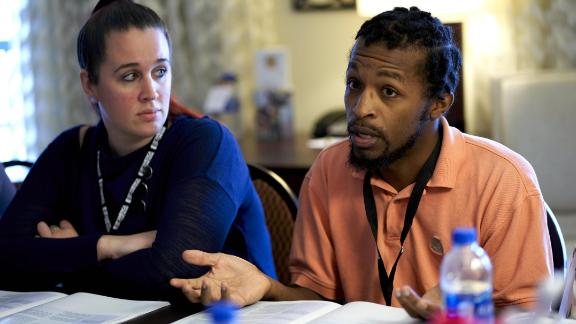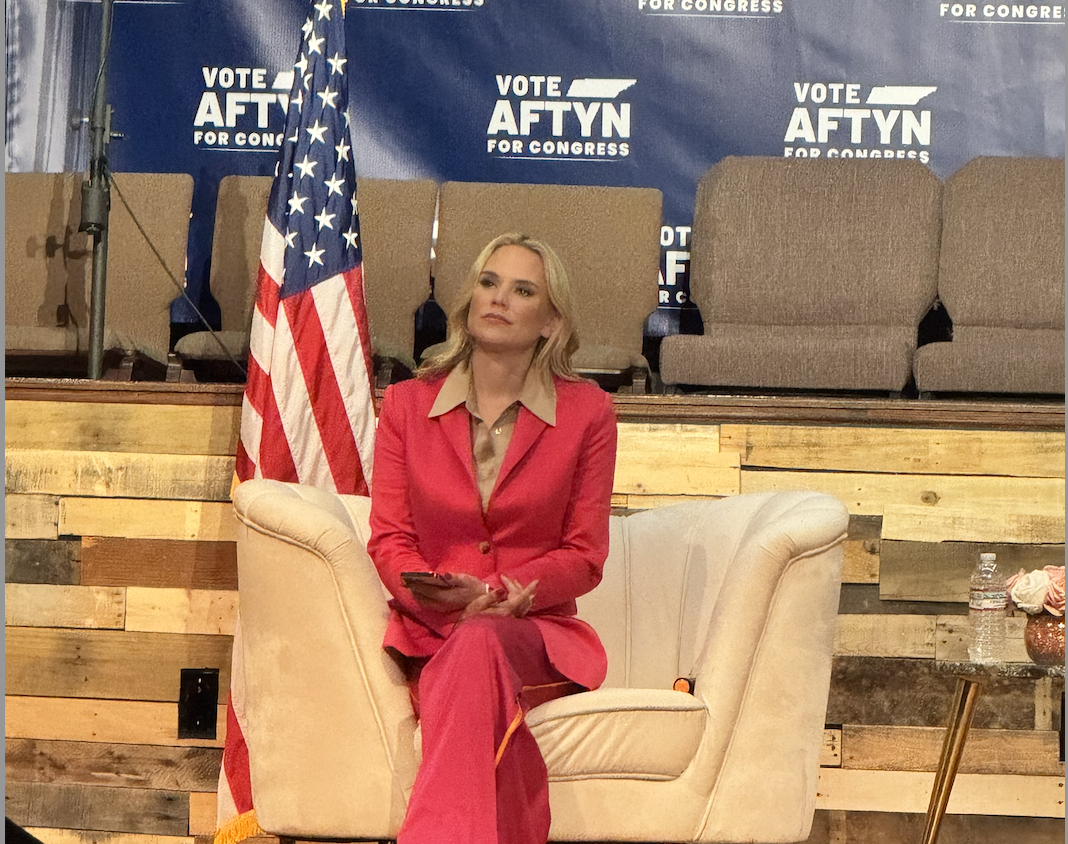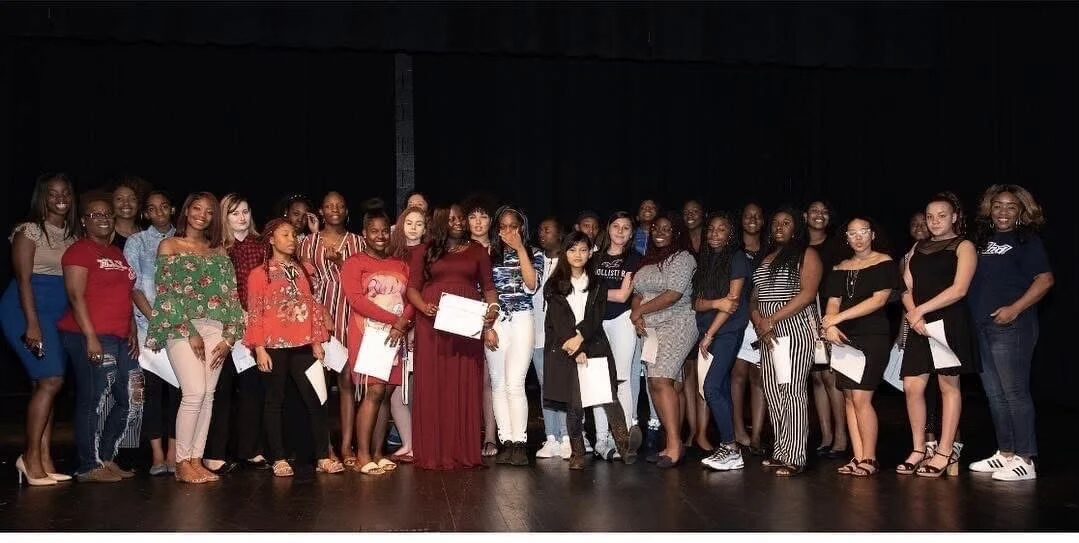By Kyung Lah and Kim Berryman, CNN
(CNN) — The arguments are heated but not insulting. The questions are probing with a purpose. This discussion on illegal immigration in the heart of North Texas is like many of those happening every day across the country, but this is not a normal discussion.
In large rooms across the Gaylord Texan Resort, passionate discussions played out among dozens of groups just like this one on the major issues in the 2020 election.
“If you’re illegal, then you’re just mooching off the country,” says Kathleen Mierzwa.
That could be the end of the immigration debate in mainstream or social media, or lead to a sharp turn to a much uglier debate, but at this gathering, that’s not the case.
“What is your real concern?” asks Natalie Montgomery from the other side of the long table. The women met just hours before, one from the Pacific Northwest and the other from the South.
“They’re illegal. They didn’t the follow the rules to get in here,” says Mierzwa.
Call it the ultimate test kitchen for the survival of American democracy, with the hope that citizens are able to move out of the bitter, partisan gridlock permeating political discourse and find solutions.
“It’s a pilot for what democracy could be,” said Jim Fishkin, the director for Center for Deliberative Democracy at Stanford University. “God knows if we don’t experiment with democracy, it’s just going to continue with deadlock division. It’s going to lose its legitimacy and we may lose our democracy.”
America in One Room
Fishkin and his colleagues assembled 526 participants, also known as “delegates,” for their project called “America in One Room.”
The name represents the goal of the organizers — assemble a representative sample of what America looks like, in one place.
“We had a hypothesis that the American people are not as polarized as the American political class, not as polarized as our elected representatives and politicians,” said Larry Diamond, a sociologist at Stanford University. All Americans need, say the researchers, is access to non-partisan information and discussion.
To test that belief, they brought together participants from 47 states. The NORC at the University of Chicago, a social research organization, pulled from a random sample of a nationally representative group of households. By income, age, gender, political party affiliation, region, education and race, NORC says the 526 participants reflect the population of registered voters.
The delegates all took a poll before arriving in the Dallas area.
Over the next four days, they met as a large group to listen to experts talk about health care, foreign policy, immigration, the environment, the economy and taxes. Several of the Republican and Democratic candidates for President spoke to the group, including Colorado Sen. Michael Bennet, former Secretary of Housing and Urban Development Julián Castro, former Rep. Mark Sanford, former Rep. Joe Walsh and former Massachusetts Gov. Bill Weld.
The large group broke down into smaller groups of 13 to 15 people to discuss key issues.
‘They look at the US as a joke’
“The things we do sometimes are just … inhumane,” says Desmond Holmes, 25. Holmes was in the US Navy and now works in IT in Salisbury, North Carolina. He’s the youngest in the group of 13, and one of three black participants in the room. He’s a registered Democrat.
Half the group identifies as Republican or independent, among them Kathleen Mierzwa, 40. Mierzwa is a home health nurse in Kennewick, Washington, who bluntly says her challenging job has taught her, “I can’t help everybody and that’s how I feel about the country.”
That’s where Mierzwa draws her conservative position on immigration and DACA, the Deferred Action for Childhood Arrivals.
“I can tell you I have a strong opinion, but I don’t have all the answers,” says Mierzwa.
Mary Krebs, 63, a retired psychotherapist, engages Mierzwa. Krebs was a registered Republican but changed parties in 2017. “I think you can guess why,” says Krebs.
“We need laws, but we also need to rule with our heart,” says Krebs.
“There are laws,” says Mierzwa.
“Yeah, and then you have a child” in the US, Krebs replies.
“You should have thought about that before you came over,” says Mierzwa.
The entire room reacts.
“I’m empathetic. I don’t want them to be separated from their families,” Mierzwa adds.
Rev. Brian McQuiggin, a pastor from nearby Clifton, Texas, jumps in. He’s a Republican and donates his ministerial time in Mexico to help migrants. He is conflicted, he says — supporting the rule of law but questioning whether his faith should rise above US immigration laws.
McQuiggin paraphrases from Matthew 25. “Christ says, ‘What you do unto the least of these, my brothers, you do unto me.’ And so it’s hard. You know, it’s hard. I feel like it’s back and forth.”
The group’s next section involves foreign policy and the conversation veers to President Donald Trump’s actions on the world stage.
“He leads along the lines of being a dictator,” says Lorenzo Spencer, 64, a retiree from Pasadena, California. “If it were to come down to a button, I think he would push it before he would go to Congress and get their advice.”
Jim Fredrickson, 68, who says he is a disillusioned Republican from Sharon, New Hampshire, says of Trump: “I don’t trust his decision making process.”
Evelyn Sierra-Mynk, 34, of Bullhead City, Arizona, defends Trump, the head of the party she’s registered to. “He’s our elected Commander in Chief,” she reminds the room.
A weird utopia
At the end of the four days of “America in One Room,” the group fills out another poll.
Those poll results, say the organizers, will show if the experiment worked. The results are expected to publish on October 2, organizers said.
Final comments in the small group’s comments suggest the researchers’ hypothesis may have merit.
“I want to say thank you,” says Kathleen Mierzwa, slowly and emotionally. “Even though we had multiple opinions, we were very civil. Even though we have different opinions, I walk out considering all of you friends.”
On the other end of the political spectrum, Natalie Montgomery, a Democrat, says she leaves less discouraged about American democracy.
“I had no plans to vote in 2020,” says Montgomery, an accountant. “I felt my vote didn’t count in elections.” Her opinion had now changed about the power of her vote.
Henry Elkus, CEO of Helena, the group that convened “America in One Room,” says the anecdotes shared out of the small groups suggest at a minimum, the participants learned to break out of their typical information silos.
“To see this weird utopia,” said Elkus, “in which people use facts as grounding for discussion was shocking to me in such a beautiful way. And if this can be exported to the rest of society, this is the kind of tool that can affect change in American democracy at scale.”
The-CNN-Wire
™ & © 2019 Cable News Network, Inc., a Time Warner Company. All rights reserved.









